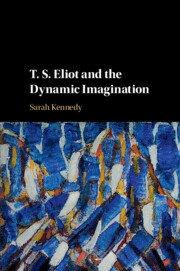Book contents
- T. S. Eliot and the Dynamic Imagination
- T. S. Eliot and the Dynamic Imagination
- Copyright page
- Epigraph
- Contents
- Acknowledgements
- Abbreviations
- Introduction
- Part I Sea Voices: Eliot’s Tempest
- Part II Broken Images: Illuminating Time and Space
- Part III Things Dying and New Born: Gestation and Resurrection
- Chapter 7 His Dark Materials
- Chapter 8 Dark Doubles
- Chapter 9 Blood for the Ghosts
- Afterword
- Works Cited
- Index
Chapter 7 - His Dark Materials
from Part III - Things Dying and New Born: Gestation and Resurrection
Published online by Cambridge University Press: 05 April 2018
- T. S. Eliot and the Dynamic Imagination
- T. S. Eliot and the Dynamic Imagination
- Copyright page
- Epigraph
- Contents
- Acknowledgements
- Abbreviations
- Introduction
- Part I Sea Voices: Eliot’s Tempest
- Part II Broken Images: Illuminating Time and Space
- Part III Things Dying and New Born: Gestation and Resurrection
- Chapter 7 His Dark Materials
- Chapter 8 Dark Doubles
- Chapter 9 Blood for the Ghosts
- Afterword
- Works Cited
- Index
Summary
- Type
- Chapter
- Information
- T. S. Eliot and the Dynamic Imagination , pp. 161 - 184Publisher: Cambridge University PressPrint publication year: 2018



